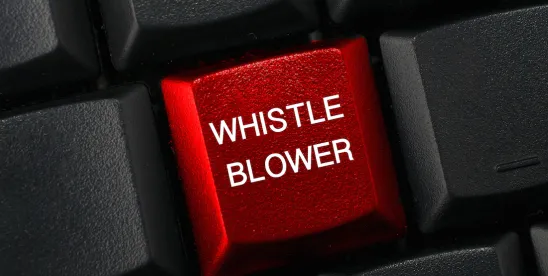After months of anticipation,1 the Department of Justice (DOJ) unveiled the details of its new Corporate Whistleblower Awards Pilot Program (the Corporate WB Program or the Program).2 The Program, effective 1 August 2024, was announced at a time when federal corporate prosecutions have dipped significantly and is designed to incentivize reporting by individuals who are aware of criminal conduct.3 In remarks announcing the Program, Deputy Attorney General (DAG) Lisa Monaco stated that it shows how the DOJ is “doubling down on a proven strategy to ferret out criminal activity that might otherwise go unreported” and explained how the DOJ has worked to “fill the gaps in the patchwork” of other federal whistleblower award programs.4 DAG Monaco acknowledged that, as with any new DOJ initiative, the Corporate WB Program will be subject to regular assessments, which could lead to refinements and requests to Congress for additional statutory authorities needed to run the Program effectively.5 Introduction of the Corporate WB Program is the latest development in a multiyear effort by the DOJ to roll out an unprecedented number of corporate enforcement policy updates, pilot programs, and incentive structures designed to encourage self-reporting. The Program represents a significant escalation in risk exposure both for companies that were not previously subject to an existing government whistleblower program and for companies that had already been subject to programs with narrower applicability. Companies must now consider that there is a stronger likelihood that employees may report alleged malfeasance to the DOJ in the first instance, rather than through internal channels like compliance hotlines or through the normal chain of command.6
Requirements
To qualify for an award under the Corporate WB Program’s guidelines, an individual must meet the following criteria:
- The individual—alone or jointly with others—provides the DOJ with information that leads to a successful criminal or civil forfeiture exceeding US$1 million in net proceeds in connection with the prosecution, resolution, or civil forfeiture action related to the underlying corporate criminal conduct.
- The whistleblower’s information must be original. The DOJ defines original information as that which is not public and not previously known to the DOJ. The information must originate from the individual’s personal knowledge or analysis.
- The information relates to certain enumerated subject-matter areas, including:
- crimes involving financial institutions, including abuses of the U.S. financial system, money laundering, or fraud;
- crimes involving foreign corruption, including violations of the Foreign Corrupt Practices Act or the Foreign Extortion Prevention Act;
- crimes involving domestic corruption; and
- crimes involving health care fraud, including fraud schemes involving private insurance plans.
- The submission must be voluntary (i.e., not provided by someone already in custody or responding to a subpoena).
- The submission must be truthful and complete, including everything the individual knows about the conduct at issue.
- The individual must cooperate with the DOJ in the investigation, including testifying as required.7
Awards Offered
Individuals that meet these requirements will be eligible for a discretionary award, calculated based on the total proceeds forfeited. For the first US$100 million in net proceeds, eligible whistleblowers may receive up to 30% of the net proceeds forfeited to the DOJ. Whistleblowers are eligible to receive as much as 5% of any forfeiture between US$100 and US$500 million.
Factors the DOJ uses to determine the percentage of the award the whistleblower receives include: (1) the significance of the information and the assistance provided; (2) participation by the whistleblower in the company’s internal compliance systems; (3) any delay in reporting; and (4) if the individual was occupying an oversight role at the company. Payment of a whistleblower award will be made only after payments to owners and lienholders with valid interests and compensation to identified victims have been satisfied.
Exclusions
In addition to clarifying that the Corporate WB Program is only available to individuals—not companies—the DOJ has also enumerated disqualifying factors that prohibit an individual from recovering under the Program, including:
- If the whistleblower is eligible for an award under another already existing whistleblower program.
- If the whistleblower is an employee or contractor of the DOJ or law enforcement, or a family member thereof.
- If the whistleblower is a foreign official.
- If the whistleblower meaningfully participated in the underlying criminal conduct.8 Notably, the Corporate WB Program is still available for an individual whose role was minimal and could be considered one of the “least culpable of those involved in the conduct of the group.”
Importantly, the Corporate WB Program does not consider information that was obtained through a communication subject to attorney-client privilege as being “original” information necessary to qualify for an award.9
Companies Can Still Qualify for Self-Report Declinations
Alongside release of the Corporate WB Program, the DOJ also announced a significant and related amendment to the Corporate Enforcement and Voluntary Self-Disclosure Policy (the CEP). Under the CEP, if a company voluntarily self-discloses misconduct, fully cooperates, and timely and appropriately remediates, there is a presumption of a declination to prosecute, absent certain aggravating circumstances. The revised CEP now provides that a company can still qualify for a presumption of a declination even if a whistleblower beats the company to reporting to the DOJ if the company: (1) receives the report through its internal hotline, (2) self-reports the conduct to the DOJ within 120 days of receiving the internal report, and (3) meets the CEP’s other cooperation and remediation requirements.10 This means that when an employee reports to the DOJ, the 120-day countdown begins. If the company reports within the 120-day window, a declination under the CEP is still on the table.
Takeaways for Companies
The Program represents a significant escalation in risk exposure both for companies that were not previously subject to an existing government whistleblower program and for companies that had already been subject to programs with narrower applicability. Companies must now consider that there is a stronger likelihood that employees may report alleged malfeasance to the DOJ in the first instance, rather than through internal channels like compliance hotlines or through the normal chain of command. Even if the employees use a company’s internal hotline, their next call may be to the DOJ. Beyond the novelty of the Program for these entities, several attributes of the Program guidance are especially noteworthy.
Is Your Compliance Program Sufficient?
One of the DOJ’s goals is to ensure entities have effective compliance programs. The preamble of the Program guidelines states that providing incentives to individuals will in turn encourage companies to maintain their compliance programs to detect criminal conduct. The DOJ even suggests that the Program could encourage voluntary self-reporting by companies. While a robust compliance program may not deter individuals from reporting to the DOJ, it may help prevent criminal conduct in the first instance. Moreover, responding to internal complaints effectively could discourage whistleblowers, and a clear record of a response will be useful to provide to the DOJ if the government eventually does come calling.
Companies should evaluate their compliance programs and reporting mechanisms to ensure they are properly tailored to the company’s risk profile. They should consider how to encourage employees to use internal reporting and ensure that reporting internally is easy and the reporting individual feels their complaints are heard and investigated.
What Does the DOJ Already Know?
In addition to incentivizing reports to the DOJ, the Program incentivizes whistleblowers to report both internally and to the DOJ. Whistleblowers that report internally and then report to DOJ within 120 days will still be eligible for an award. Moreover, whether the whistleblower used internal reporting mechanisms will also be a consideration in determining the amount of the award.
This change means companies cannot assume that matters reported internally have not also been reported to the DOJ. On the contrary, hotline calls could be considered ticking time bombs, opportunities for companies to act and voluntary self-disclose before or shortly after the individual approaches the DOJ. Simultaneous reporting is also possible. Companies should ensure that all hotline and other reporting is taken seriously and investigated with appropriate care.
Companies Have 120 Days to Self-Report
Additionally, companies need to keep their eyes on the clock. The related amendments to the CEP give companies 120 days from the date an internal report is made to their hotlines to self-report to the DOJ in order to qualify for the benefit of the presumption of a declination. This means that it is critical that companies ensure their reporting hotline is sophisticated and monitored such that reports are logged and evaluated as soon as they come in. Companies will need to investigate internal complaints in an expedited fashion to try to determine whether or not there is any validity to the claims. Lastly, a company will need to evaluate within the 120-day window whether the benefits of self-reporting to the DOJ outweigh the risks and costs of subjecting themselves to DOJ scrutiny.
The DOJ Will Penalize Impeding or Retaliation
The Program guidance also emphasizes that any retaliation against a whistleblower will be considered in assessing an entity’s cooperation with the investigation, potentially resulting in the DOJ’s refusal to award cooperation credit. The DOJ may also consider retaliation to constitute obstruction of justice, leading to potential related enforcement actions.
The DOJ also bars any company from impeding any individual from communicating with the DOJ about a possible violation. This includes use of confidentiality and nondisclosure agreements that do not sufficiently carve out reports to law enforcement from the obligation to maintain confidentiality. Such agreements that bar communication with DOJ could impact a company’s cooperation credit or the DOJ’s assessment of the entity’s compliance program.
Footnotes
1 For discussion of the DOJ’s original 7 March 2024 announcement, see our previous alert: https://www.klgates.com/Dialing-for-Dollars-US-Department-of-Justice-Announces-New-Whistleblower-Pilot-Program-3-15-2024.
2 Criminal Division Corporate Whistleblower Awards Pilot Program, available at https://www.justice.gov/criminal/criminal-division-corporate-whistleblower-awards-pilot-program.
3 See U.S. DEP’T OF JUST., FRAUD SECTION YEAR IN REVIEW 5 (2019), https://www.justice.gov/criminal/criminal-fraud/file/1245236/dl; U.S. DEP’T OF JUST., FRAUD SECTION YEAR IN REVIEW 7 (2020), https://www.justice.gov/criminal/criminal-fraud/file/1370171/dl (one reason the total global monetary amount sharply increased in 2020 was because of two massive corporate resolutions—Airbus and Goldman Sachs); U.S. DEP’T OF JUST., FRAUD SECTION YEAR IN REVIEW 6–7 (2021), https://www.justice.gov/criminal/criminal-fraud/file/1472076/dl#:~:text=In%202021%2C%20the%20Fraud%20Section,of%2030%20individuals%20at%20trial.; U.S. DEP’T OF JUST., FRAUD SECTION YEAR IN REVIEW 6 (2022), https://www.justice.gov/criminal/criminal-fraud/file/1568606/dl; U.S. DEP’T OF JUST., FRAUD SECTION YEAR IN REVIEW 7 (2023), https://www.justice.gov/criminal/media/1339231/dl.
4 Deputy Attorney General Lisa Monaco Delivers Remarks on New Corporate Whistleblower Awards Pilot Program (August 1, 2024), https://www.justice.gov/opa/speech/deputy-attorney-general-lisa-monaco-delivers-remarks-new-corporate-whistleblower-awards.
5 Id.
6 For a deeper dive on the suite of new programs unveiled by the DOJ since 2022, designed to incentivize employees or companies to blow the whistle when they learn of potential corporate misconduct, see Harper, et.al, The Department of Justice Wants You to Call. And It Wants You to Put Its Number on Speed Dial, 2 THE J. OF FED. AGENCY ACTION 353 (2024), available at https://marketingstorageragrs.blob.core.windows.net/webfiles/Harper.pdf.
7 Id.
8 Id.
9 Id.
10 Criminal Division Corporate Enforcement, https://www.justice.gov/criminal/criminal-division-corporate-enforcement.






 />i
/>i

